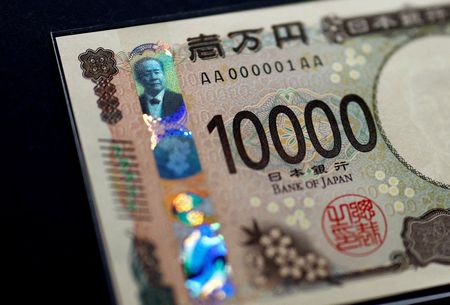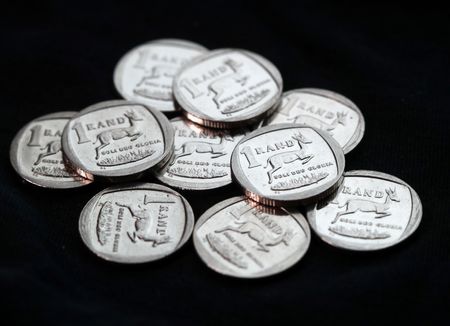By Ozan Ergenay and Joice Alves
LONDON (Reuters) -The yen fell to a 10-month low on Wednesday after Finance Minister Satsuki Katayama said Japan’s new government was closely monitoring markets, while sterling eased after declining British consumer price inflation raised expectations for a Bank of England cut.
In the meantime, the dollar edged higher ahead of Nvidia’s earnings release and key U.S. data.
Japanese government ministers including Finance Minister Satsuki Katayama met Bank of Japan Governor Kazuo Ueda on Wednesday. The yen fell after comments by Katayama, who said the government was closely watching the market “with a high sense of urgency”.
The currency has been falling on market expectations that Prime Minister Sanae Takaichi’s new administration will deliver a huge spending package backed by low interest rates.
In Britain, consumer price inflation fell to 3.6% in October, from September’s joint 18-month high of 3.8%, as expected by the BoE and economists polled by Reuters, official figures showed on Wednesday.
INTERVENTION RISKS WEIGH ON YEN
The yen eased 0.3% to 156.15, after hitting its lowest against the dollar since January.
“The big move has obviously been done over yen… The risk of intervention obviously rises,” said Sonja Marten, Head of Research Currencies and Monetary Policy at DZ BANK.
“There’s obviously some concern over the current weakness of the yen. But I think the problem is that it’s quite difficult for the government to decide what to do about this. I mean, intervention has a long but not always highly successful history in Japan.”
The inauguration last month of Takaichi, who is known as an advocate of expansionary fiscal and monetary policy, has complicated the BOJ’s efforts to gradually push up still-low interest rates.
The Kyodo news agency reported Japan’s stimulus package could exceed 20 trillion yen ($129 billion) and be funded by an extra budget of around 17 trillion yen.
BOE EXPECTED TO CUT RATES IN DECEMBER
UK inflation data cemented expectations that the BoE could cut interest rates in December.
“We think Governor (Andrew) Bailey will feel more confident about cutting Bank Rate below 4%,” said Deutsche Bank chief UK economist Sanjay Raja.
Sterling was down 0.14% against the dollar at 1.3125, briefly touching its lowest since Friday, when British markets were whipped around as speculation swirled around the highly-anticipated November 26 budget, which remains the key event for sterling this month.
PIVOTAL MOMENT
Elsewhere, investors focused on third-quarter earnings reports from chip giant Nvidia, while U.S. agencies were clearing a backlog of data after a prolonged government shutdown.
Global equity markets have been hit hard this week on concerns about valuations of AI stocks.
“Nvidia’s results have become a macro event, acting as a bellwether for the defining investment theme of our time,” said Kenneth Lamont, Principal at Morningstar.
Francesco Pesole, FX strategist at ING said Nvidia results will likely be a “pivotal moment”.
“It’s not a very common thing to happen, that one earnings release has major impacts on the FX market. If those are extremely good or extremely bad, then obviously it will be a very meaningful impact,” he said.
The dollar index, which measures the greenback’s strength against a basket of six currencies, edged 0.07% higher at 99.65.
ING’s Pesole said the positive moment for the dollar reflects a combination of safe-haven flows and doubts around Fed pricing in December.
Fed funds futures are pricing an implied 47% probability of a 25-basis-point cut at the December 10 meeting, compared with a 42.4% chance a day earlier, according to the CME Group’s FedWatch tool.
U.S. President Donald Trump renewed his attacks on Federal Reserve Chair Jerome Powell on Tuesday, saying “I’d love to get the guy currently in there out… but people are holding me back.” Powell’s term as Fed chair is up in May.
Another test will come with the delayed release of Thursday’s non-farm payrolls release for September, after initial jobless claims data released on Tuesday showed the number of Americans on jobless benefits surged between mid-September and mid-October.
Amid the rout in risk assets, the Australian dollar fell 0.3% to $0.6489, while the kiwi slipped 0.5% to $0.5627.
The Norwegian crown fell 0.4% to 10.1418.
($1 = 156.1800 yen)
(Reporting by Joice Alves and Ozan Ergenay in London; additional reporting by Gregor Stuart Hunter in Singapore; Editing by Alex Richardson)











